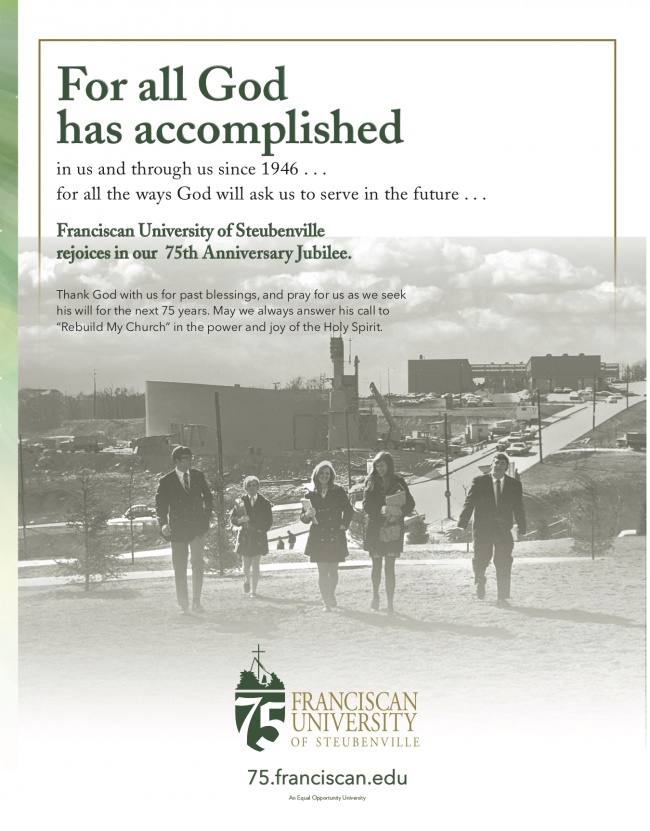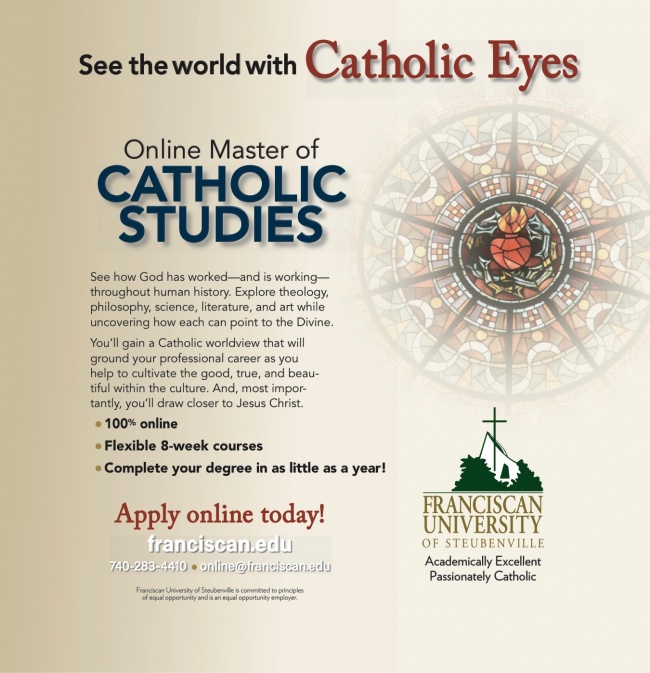AD: Franciscan University—Celebrating 75 Years of Service to the Church
For more information about the celebrations for the University's 75th Anniversary, please go to 75.franciscan.edu. Or call (740) 283-3771.

AD: Online Master's Degree in Catholic Studies
To find out more information or to apply, click here or call (740) 283-3771.

A Half Century of Progress: The Church’s Ministry of Catechesis Part One: International Catechetical Study Weeks (1959–1964)
Editor’s Introduction: The last one hundred years have seen significant developments in how the Church has understood the nature of her catechetical mission. There has been both a movement toward the past and a movement toward the future: a desire to recover the dynamism seen in the teaching of Christ and the catechesis of the early Church as well as an eagerness to help catechists meet new challenges by thoughtfully engaging contemporary insights. Three catechetical directories have been written, as well as summaries from numerous Study Weeks and official documents, through which we can trace a compelling description of how the catechetical mission might be best carried out. Monsignor John Pollard, a man who has served as a prominent catechetical thinker and leader as many of these developments have taken place, presents this helpful series detailing the trajectory of how the Church has articulated her catechetical mission to make disciples. We hope you enjoy this series.
Even before Pope John XXIII convoked the Second Vatican Council, the Church was wrestling with the challenge of remaining relevant in a rapidly secularizing world. This sense was felt among Church leaders, theologians, catechists, and the lay faithful in general. Within the fields of catechetics and liturgy, a renewal and reform movement began to surface that saw value in bringing catechetical and liturgical leaders from different parts of the world together to share their experiences of proclaiming the Gospel and celebrating the rites of the Church within the cultures of their respective countries.
In the history of the modern catechetical movement, the series of six International Catechetical Study Weeks that were held in Nijmegen, Holland (1959); Eichstätt, Germany (1960); Bangkok, Thailand (1962); Katigondo Seminary, Uganda (1964); Manila, Philippines (1967); and Medellin, Columbia (1968) appear now, over fifty years later, to have been significant directional moments in the renewal and reform of catechetics. When taken together, the resolutions, conclusions, and summaries of these six International Catechetical Study Weeks constitute an important element of the framework within which catechetics has evolved before, during, and after the Second Vatican Council. Especially in the days before Vatican II, there seemed to be heightened worldwide interest in global concerns, diversity within the Church, and the Church’s coexistence in the world with both other Christian and non-Christian religious traditions. The International Catechetical Study Weeks directly involved the participants with these concerns precisely because they were international in scope and missionary in focus.
The Science of Evolution in Light of the Catholic Understanding of the Human Person
A powerful narrative exists within the popular culture that the advancements of modern science pose an existential threat to religious belief. This narrative, popularized by many influential authors, argues that scientific discovery is gradually upending the stranglehold Christian “superstitions” have held over the popular imagination. Nowhere is this apparent conflict more evident than in the field of evolutionary biology. For example, Christians maintain that we are made in the image and likeness of the Creator, yet many advocates of evolutionary theory claim humans are a meaningless twig on the evolutionary tree of life.
This view holds such force that Pope Benedict XVI felt compelled to state in his inaugural Pontifical homily that “We are not some casual and meaningless product of evolution. Each of us is the result of a thought of God. Each of us is willed, each of us is loved, each of us is necessary.”[i]
[i] Benedict XVI, “Homily of His Holiness Benedict XVI” (April 24, 2005).
Editor's Reflections: The Spiritual Life and Our Missionary Potential
 There have been some very good books written in the past few years centered on helping parishes to become mission-focused.
There have been some very good books written in the past few years centered on helping parishes to become mission-focused.
From the Shepherds: Community Life - in the Directory for Catechesis
Unto Us a Child Is Born
Some people approve of “baby-worship;” others don’t. I’m one of the worshippers. Baptizing babies—the younger the better—is one of the greatest joys of my priesthood. I love to see and hear babies at Mass. They preach a far better sermon than I could ever do. By raising their voices in praise of God, they tell us that a mother has had a baby, and that her faith is so fundamental to her life that she wants to bring the child to Mass with her. Thank God for mothers and fathers and babies! On Christmas Day Our Lady and St. Joseph, the angels, and the shepherds all worship a baby, the baby. Of course, they worship him! This baby, this child born for us, this Son given to us, wrapped in swaddling clothes and lying in a manger, is God the Son, eternally begotten of the Father in the Godhead, and on Christmas day is born in time and human nature of the Ever-Virgin Mary. Of course, we must worship him!
Catholic Schools: The Incarnation – A Model of Perfect Inculturation
There have been many moments where, although I’m still relatively young, I have felt generations older than the students that I teach. Moments where I use a # next to a number and they get confused because they think it’s a social media hashtag. Moments where they teach me what words like “simp” and “sus” mean because I have never heard of them. Moments where I have to do a web search for what a VSCO Girl is because they keep saying it and I don’t want to appear naive. It’s all good fun and keeps me on my toes, but there is also a very real call from the Lord in these moments. As a teacher, Christ remains the model for all of my teaching; thus, I must imitate him in his incarnation.
The Impact of the Incarnation
To say that “the Word became flesh and dwelt among us” (Jn 1:14) carries great weight, particularly to an educator. The wonder of the Incarnation should impact every Catholic—the fact that God humbled himself to become like his lowly creation is an act of pure love that should astound us and draw us to love him more—but there is an even deeper calling for those of us working in the vineyard. We must imitate the example of inculturation that Jesus shows through the Incarnation. In this way, we are able to meet our students where they are, just as God met humanity by assuming our human nature and being born into the world in the same manner that every other human does. A mystery as infinitely great as God is not so easily comprehended by the human mind. By assuming our human nature, Jesus walks among us, like us in every way except sin, so that we cannot say that we have a great high priest who does not sympathize with our humanity (c.f. Heb 4:15).
Decolonizing the Curriculum in the Light of the Incarnation
On March 9, 2015, protests erupted among students of the University of Cape Town, South Africa under the slogan #RhodesMustFall. They demanded that the statue of British colonial-era politician and diamond magnate Cecil Rhodes be removed from a prominent place on their campus. The protest was given further impetus internationally by movements such as Black Lives Matter as well as reactions to widespread accusations of institutional racism. In addition to inspiring demands for other statues to be torn down or relocated—from Edward Colson in Bristol, England, to Hannah Duston in New Hampshire—the broader demands of the protest gave birth to an academic movement known as “Decolonizing the Curriculum.”
This term itself is contested and therefore difficult to define. For its supporters, Decolonizing the Curriculum (DtC) entails the balancing and broadening of the academic curriculum in schools and universities from an exclusively Western-centered canon of ideas and texts to include the philosophy, worldviews, and history of other cultures. For its skeptics, it is another front in a seemingly endless culture war, which may threaten to undermine the foundations of Western Christian civilization itself. As one of the most discussed issues in education today, it is timely for us who work in Catholic schools and universities to consider the issue in the light of our faith, despite the risk of controversy. In seeking a balanced way forward, reflection on the wonder of the Incarnation may provide a way out the impasse.
Antiquum Ministerium: Instituting the Ministry of Catechist
On May 10, 2021, Pope Francis formally instituted the ministry of catechist with the apostolic letter Antiquum Ministerium, which he issued motu proprio, or on his own initiative and under his personal signature. An initial reaction to the formal institution of the role of catechist might be to wonder, “So what’s new?” The role of catechist has been understood as a ministry of the Church since the first century.
In the first sentence of this apostolic letter, Pope Francis refers to catechesis as an ancient ministry.[1] Indeed, twice in the Gospel of Luke, twice in his Acts of the Apostles, and twice in Paul’s Epistle to the Galatians the precise use of different forms of the Greek verb katécheó, meaning to teach by word of mouth and from which the term “catechesis” is derived, clearly identifies the roots of this ancient ministry and describes its parameters. The ministry of catechesis, then, from the earliest days of the Church seems specifically included among the ways the disciples of Christ could be faithful to his imperative to “go . . . and make disciples of all nations, baptizing them in the name of the Father, and of the Son, and of the Holy Spirit, teaching them to observe all that I have commanded you” (Mt 28:19; emphasis added).


